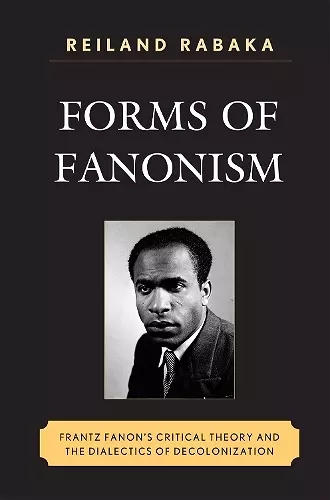Forms of Fanonism
Frantz Fanon's Critical Theory and the Dialectics of Decolonization
Format:Hardback
Publisher:Lexington Books
Published:8th Mar '10
Currently unavailable, and unfortunately no date known when it will be back
This hardback is available in another edition too:
- Paperback£53.00(9780739140345)

When Frantz Fanon's critiques of racism, sexism, colonialism, capitalism, and humanism are brought into the ever-widening orbit of Africana critical theory something unprecedented in the annals of Africana intellectual history happens: five distinct forms of Fanonism emerge. Forms of Fanonism: Frantz Fanon's Critical Theory and the Dialectics of Decolonization is discursively distinguished from other engagements of Fanon's thought and texts insofar as it is the first study to consciously examine his contributions to Africana Studies and critical theory or, rather, the Africana tradition of critical theory. Forms of Fanonism identifies and intensely analyzes Fanon's contributions to the deconstruction and reconstruction of Africana Studies, radical politics, and critical social theory. In highlighting his unique "solutions" to the "problems" of racism, sexism, colonialism, capitalism, and humanism, five distinct forms of Fanonism materialize. These five forms of Fanonism allow contemporary critical theorists to innovatively explore the ways in which his thought and texts can be dialectically put to use in relieving the wretched experience of this generation's wretched of the earth. Critics can also apply these forms to deconstruct and reconstruct Africana Studies, radical politics, and critical social theory using their anti-imperialist interests. Throughout Forms of Fanonism, Reiland Rabaka critically dialogues with Fanon, incessantly asking his corpus critical questions and seeking from it crucial answers. This book, in short, solemnly keeps with Fanon's own predilection for connecting critical theory to revolutionary praxis by utilizing his thought and texts as paradigms and points of departure to deepen and develop the Africana tradition of critical theory.
In Forms of Fanonism, Reiland Rabaka advances the enterprise of Africana critical theory to a level of articulation not previously achieved while anchoring his efforts and guiding agenda in a principled commitment to radical and revolutionary humanist liberation for persons and peoples of African descent, and for all of the 'wretcheds of the earth.' Rabaka is on the threshold of becoming one of the foremost critical social theorists of his generation. -- Lucius T. Outlaw Jr., Vanderbilt University
Forms of Fanonism: Frantz Fanon’s Critical Theory and the Dialectics of Decolonization, the latest installment in Reiland Rabaka’s brilliant articulations of and explorations in Africana critical theory, brings both ancestral and living voices to bear on revolutionary questions of theoretical anthropology, social transformation, and reflective critique on theory and the quest for freedom. Rabaka’s text is detailed, rich with nuance, and without didacticism; the passion and care he brings to each “form,” as he calls these manifestations of thought and praxis, are inspiring, and the scholarship edifying. The work is a true exemplar of the Fanonian encomium to the body, in this case the historically unfolding body of revolutionary humanistic thought—to be, that is, that which questions. -- Lewis R. Gordon, author of What Fanon Said
Rabaka (Africana studies, Univ. of Colorado) asserts that Frantz Fanon's ideas continue to be relevant and inspirational. The introduction appeals for a wider 'transdisciplinary' methodology to Africana critical theory, a veritable shift toward 'epistemic openness,' which he subsequently implements. The author presents five dimensions or 'forms' of Fanonism: 'Anti-racist,' 'Decolonialist,' 'Marxist,' 'Feminist,' and 'Revolutionary Humanist.' Each form is a facet of Fanon's oeuvre. Rabaka critically and exhaustively examines each form, and gives comparative attention to W.E.B. Du Bois, Jean-Paul Sartre, Aimé Césaire, Karl Marx, Amilcar Cabral, and Léopold Sédar Senghor, among others....This is a valuable volume for manifold reasons—notably, its erudite narrative, bold approach, and comprehensive bibliography of English-language works on Fanon and critical theory....Rabaka's work will especially serve specialists and advanced students. Summing Up: Recommended. * CHOICE *
Rabaka’s work on Frantz Fanon is both an instance of Fanon extended and Fanon applied, enabling it to stand above other books about him....Throughout this book, Rabaka dissects phrases from Fanon that have been misinterpreted over time. His subheadings in the book are clever; they build anticipation and arguments to come for the reader to develop. It is apparent that Fanon is the scholar activist to which we should all ascribe. Rabaka suggests as much in his concluding discussion about the need for Africana studies to emulate Fanon. Although Fanon said “I do not come with timeless truths” (p. 292), to a certain degree, he underestimated the extent to which he actually did offer a blueprint for the discipline. Reading this book encourages us to practice what we preach. * Journal Of African American Studies *
ISBN: 9780739140338
Dimensions: 244mm x 168mm x 29mm
Weight: 778g
430 pages